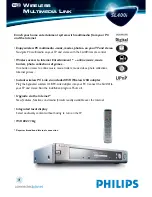
VER 1.0
17
Clear RAID (Non-RAID)
Clear RAID - also known as JBOD (Just a Bunch of Drives) refers to a group of
hard drives. In CLEAR RAID, the number of logical drives is equal to the number
of physical drives. This mode allows the XD5 to operate as a multi-drive storage
enclosure, but provides no data redundancy. Each drive will be shown as a
separate drive up to 5 drives. If one drive fails, the others are not affected.
1
Parity data is used by some RAID levels to achieve redundancy. If a drive in the array fails,
remaining data on the other drives can be combined with the parity data (using the Boolean XOR
function) to reconstruct the missing data. Parity data, quite simply, is the result of a quick
equation. Here's a simple way to think of parity: 6 + 3 = 9
Imagine the 6 is on one hard drive, the 3 on another, and the 9 on a third. The 3 and the 6 are
your data, but the 9 is the result of a simple equation. If a hard drive was to fail, and you lost for
example, the 3, you could do a simple calculation to retrieve the 3 (9 minus 6).
FAQ
CHOOSING THE RAID MODE
Q:
How do I choose the proper RAID configuration for my XD5 based on the
tasks I need to perform?
A:
The XD5’s selectable RAID configuration settings can help you administer how
the XD5 handles stored data. It is recommended you choose the RAID
configuration that is most applicable to your task. The most common factors
affecting the choice of which RAID mode to choose are capacity, speed, and data
protection. For example, if you are using the XD5 to store entertainment media
or for backup, RAID 5 mode can be used; it offers the combined capacity of the
multiple drives while writing to one drive at a time. If your work requires
continuous backup of the data and redundancy, then RAID 10 would be the best
choice, however capacity is reduced to the capacity of the 2 smallest drives. If
you need the faster data access, then the enhanced speed of RAID 0, which
combines the drives for maximum capacity and writes data simultaneously to the
drives, may be the most appropriate.
DAISY CHAINING
Q:
Because there are two FireWire ports on the XD5, I connected them to two
external devices. Why can’t I see these additional external devices on my host?
I’m using the USB connection from the XD5 to my computer.
A:
In order for the XD5 to work properly, one of the FireWire ports needs to be
connected to the computer, and the other one can be connected to an external
device. The XD5 should only be connected to a host computer via one type of
interface cable. Connecting the XD5 to a computer simultaneously via two or
more interface cables is not recommended and can cause data loss. More
instruction on daisy chaining FireWire devices can be found at Avastor on You
Tube.
http://www.youtube.com/watch?v=FVA6rzaOVqI&tracker=False



































